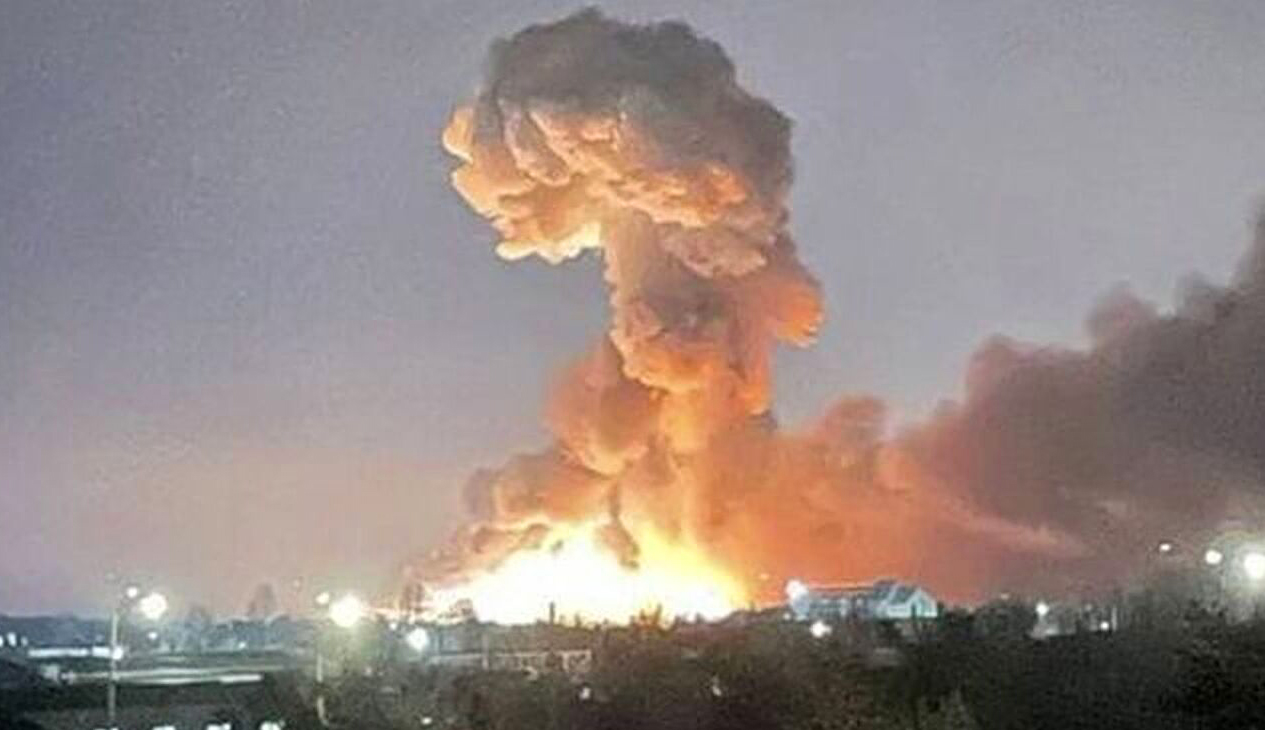I believe, though, that this argument, though compelling, is ultimately mistaken. There are three reasons why.
We are already seeing, as always, a sharp distinction being drawn between civilian and combatant casualties in Ukraine, as if it matters, morally, which particular innocent people are being killed in pursuit of Putin’s expansionist aims. I think we should resist this distinction in general: it’s typically no morally better to kill combatants in the pursuit of unjustified ends than it is to kill civilians. Indeed, as Victor Tadros has argued, insofar as killing combatants makes it more likely that the unjustified war will succeed, there’s at least one important respect in which killing combatants is morally worse than killing civilians. Killing combatants isn’t just wrong in itself; it’s also a means of achieving further grave wrongs.
“Why Russian Soldiers Should Lay Down Their Arms” by Jovana Davidovic
Second, though Ukrainian armed forces are ultimately charged with protecting Ukrainian citizens, those citizens might actually prefer that the armed forces continue fighting even if it increases the chances that those civilians will be maimed and killed. In such a case, the decision to continue fighting does not violate the rights of the civilians consequently killed if such civilians antecedently indicated a willingness to accept that risk. Of course, not all civilians might agree to this gamble. And some, such as children, cannot even in principle agree to it. But reports indicate not only widespread civilian support for military resistance, but also widespread civilian participation in such resistance, which suggests that they are willing to risk life and limb in the face of overwhelming odds—at least for now.
It turns out, though, that there is much to consider. I will focus on just one issue. A foundational principle in war ethics is that we ought not to resort to ineffective or unnecessary bloodshed. It might be argued that Ukraine is violating this constraint. After all, Ukraine’s resort to defensive violence will result in the loss of life and limb. And to what end? Though Ukrainian forces have proved quite robust much to the surprise of Russia and the rest of the world, Putin’s forces could respond with overwhelming brutality from land, sea, and air. The use of nuclear weapons is a possibility as well. Alternatively, Putin might adopt a more insidious approach, by blockading the Black Sea ports of Mariupol, Kherson and Odessa, which are crucial to Ukraine’s economic viability. Putin could then just wait until Ukraine collapses into a failed state. In any case, if we suppose that the Ukrainian military is unlikely to emerge victorious against Russian forces, the continued loss of life—especially of Ukrainian civilians—does not seem to achieve a good sufficiently important to justify that bloodshed. As a result, some might argue that Ukraine should surrender, thereby saving the lives of many Ukrainians who would otherwise have died for no seemingly useful purpose. The arguments from consent and ignorance, and the argument for importance of obedience all fail when faced with examples such as the Russian invasion of Ukraine. But one final argument for the equality of combatants remains. Even if we accept that a Russian soldier today is not a moral equal of a Ukrainian civilian that has just picked up arms (or a Ukrainian soldier for that matter), it doesn’t follow that we should have laws that prohibit fighting in an unjust war and that ask soldiers to question the justice of the wars they fight in. If we attempted to pass laws that would hold soldiers responsible for fighting in unjust wars we would end up with bloodier, more deadly wars that would get fought until the bitter end. What soldier would put down her arms if she thought she’d be prosecuted simply for fighting in a war. But is this really the case? This common argument envisions that instead of equality of combatants and justification for soldiers fighting unjust wars, we would simply have a prohibition. But there is no reason for such limited imagination. The alternative to moral and legal equality is not simply its rejection, but creative mechanisms for allowing soldiers the path and the understanding they need to choose not to fight in wars of aggression. This can take a form of selective conscientious objection, changes in the social norms around why and when we praise our soldiers, and encouragement to soldiers fighting in unjust wars to stop. In the recent days we have heard such encouragement from President Zelensky, Estonian president, a brave Belorussian lieutenant commander, and others. Encouraging Russian soldiers today to remember what honorable fighting looks like, and put down their arms, is maybe a pie in the sky, but changing our norms regarding equality of combatants and what legitimate fighting in a war looks like, is not. Seeing at least some in the Russian military stand up against this unjust invasion will pay dividends in the days and years to come. Long-lasting peace can only come from respect and reconciliation. And knowing that at least some Russian people and Russian soldiers did the right thing can help sustain a healthy peace one day.
Who in their right mind would have called her a moral equal to a Nazi soldier, and who in their right mind would call Hlib a legitimate target for the Russian military. And yet, traditionally in just war theory, and legally in practice, we think of combatants fighting in the war as moral and legal equals regardless of the justice of their cause. The moral and legal equality of combatants is so deeply embedded in our societies that we see no dissonance in supporting the troops even when we do not support the war. Soldiers are never prosecuted or held responsible simply for fighting in unjust wars. And combatants on all sides of the conflict are seen as legitimate targets; equally justified in killing the enemy. The reasons behind this widely spread (moral, legal, and social) norm of combatant equality are varied.
If it does support insurgents, the US should certainly be careful about which elements it assists. This is all the more important because the factions that benefit most militarily from that assistance are also likely to increase their influence politically. Analysts of civil war like Stathis Kalyvas have shown how political allegiances often follow military successes. This suggests that any military force that outsiders introduce within Ukraine will likely leave an imprint on the political complexion of the country. And this cuts both ways. Supporting democrats may be politically beneficial. Failing to assist them would leave the field open to other political influences. The current Russian leadership has an acute sense of how to reshape the political map of a foreign state in whatever way best suits their interests, as it has demonstrated in Syria and elsewhere. And the invasion of Ukraine shows that it has even fewer scruples about doing so than observers realized.
It might seem that the study of war ethics has little to add when it comes to morally evaluating Russia’s war in Ukraine. Consider Vladimir Putin’s motivations for the invasion. His goals might be security-driven, in that he fears NATO’s expansion in Eastern Europe. Or perhaps a revanchist nostalgia for the Russian empire is what motivates Putin. Or maybe he seeks to re-litigate the outcome of the Cold War. Or maybe Putin fears that the recent liberalization and democratization of Ukraine might spread to Russia, threatening his brand of kleptocratic authoritarianism. What is notable about these (and other) candidate explanations, is that none of them morally justify invading a peaceful, sovereign nation. His purported justifications are risible and fail to withstand even cursory examination. It is luminously obvious that Putin’s war in Ukraine is unjust. Given this, what can the study of war ethics, with its myriad principles, distinctions, and doctrines, possibly add to a moral evaluation of this war? Bringing the study of war ethics to bear on the invasion of Ukraine seems, to borrow a phrase from Hermine Wittgenstein, like using a scalpel to open up crates.
There’s nothing that those of us who work on the ethics of war can do to curtail Russia’s aggression. But we can at least refuse to entertain the idea that there might be permissible ways of pursuing this aggression. This means, amongst other things, resisting the habit of reverting to the in bello checklist when news outlets ask us to comment on the war. Ukraine is an abject lesson in why we should reject the idea that the fighting of war is morally independent of the justness of the war itself. It is also a lesson in why we should, in general, resist the idea that there are special moral principles that govern war. Our very ordinary moral principles, familiar from everyday life, tell us that it’s impermissible to use force to try to acquire something to which you’re not entitled in the first place. Nothing changes when that force is deployed by states or other political collectives: the Russian regime does not enjoy special permissions to do violence that are denied to individuals. Putin’s war wears its injustice on its sleeve; it is condemned by our most familiar, fundamental convictions about people’s rights against harm. Again, you don’t need a just war theorist to tell you that.

The midst of a war, with people being killed and injured, homes being destroyed, lives being disrupted, and dictatorship threatening, might seem like a poor time for philosophy. Yet the urgency of war and the significance of its effects makes it all the more important that those whose jobs involve thinking through the thorny moral problems war presents contribute to public discourse. The moral questions war raises have long been of interest to philosophers, and contemporary philosophy of war is a very active field.
[Explosion in Ukraine during the Russian attack. Source: marca.com]
War Ethics and Russia’s Invasion of Ukraine
by Saba Bazargan-Forward
[Explosion in Ukraine during the Russian attack. Source: marca.com]
Why Russian Soldiers Should Lay Down Their Arms
by Jovana Davidovic
[Explosion in Ukraine during the Russian attack. Source: marca.com]
Arming Democratic Rebels Abroad
by Christopher J. Finlay
[Explosion in Ukraine during the Russian attack. Source: marca.com]
Ukraine and the Ethics of War
by Helen Frowe
First, fighting to the bitter end does indeed serve a useful and morally important purpose: it imposes a cost on unjust international aggression thereby making it less likely that the aggressing party will resort to such measures against other countries in the future. If Putin’s forces were able to just waltz into Ukraine, Putin might be more likely to do the same in other ex-Soviet bloc countries. Ukraine’s military resistance, even if it fails to repel Russian forces, helps increase the chances that other countries will remain free from Russian aggression. And that is an important good.
While some philosophers argue that widespread popular support is usually required for armed resistance to be morally legitimate, Allen Buchanan questions how realistic it is to expect the leaders of rebellion against violently oppressive regimes to satisfy this condition. Interveners shouldn’t expect too much. But Ukraine is an unusual case. Not only does it already have legitimate leadership as a result of its democratic institutions, but there is also polling evidence indicating support for resistance. Just over 50% said they would resist, with one in five respondents saying they would be willing to engage in civil resistance, and one in three that they would take up arms. Reports and images of citizens stepping forward to claim weapons and take up training from the government abound.

(Philosophers On is an occasional series of group posts on issues of current interest, with the aim of showing what the kinds of thinking characteristic of philosophers and scholars in related fields can bring to popular ongoing conversations. Contributors present not fully worked out position papers but rather brief thoughts that can serve as prompts for further reflection and discussion.)
So, offering arms to Ukrainian insurgents no doubt poses risks, but then so does non-intervention. If more assistance is coming, it should arrive sooner rather than later, while democratic political forces in Ukraine remain strong.
There is much more for war ethicists to assess as far as the war in Ukraine is concerned. For example: are the Russian combatants, by waging an unjust war, violating the rights of Ukrainian soldiers? Does the US have the moral standing to criticize Russia’s aggression given the dubious basis for the 2003 US-led war in Iraq? What duties of aid do other countries have toward Ukraine – especially the countries that enriched Russia, and thereby indirectly funded its military by purchasing Russian oil and gas?
If there ever was a time to reconsider this view, this seems to be that time. Regarding arguments from consent, those that join up solely to fight in a single war against occupation cannot be moral equals to those that occupy. Their “picking up the arms” cannot signal consent to being a target, even if we think that joining a standing military ordinarily does. Regarding arguments from ignorance, those soldiers whose military crosses someone else’s borders, cannot claim ignorance. At a minimum those that cross the borders have strong reasons to question whether their country is the one engaging in self-defense. And those that worry that without obedient armies we will lose just wars, have only to look at what happens when one needs to fight a war of just self-defense like Ukrainians are doing now.
On February 24th, Russia began an invasion of Ukraine, starting with missile strikes on several locations, including Ukraine’s capital, Kyiv, and since then has continued its attack via air and ground warfare, despite near universal international condemnation of its actions.
Nevertheless, the war does shed light on one of the central debates in recent work on the ethics of war. According to what we might call the traditional view of the ethics of war, the fact that a war is unjustified has nothing to do with whether it is being justly fought. This position is famously defended by Michael Walzer in his seminal 1977 book Just and Unjust Wars. It continues to dominate public and political discourse about war, not to mention international law. On this view, the fact that Putin’s war is unjustified is no bar to its being justly fought. This is why, faced with an unjustified war, commentators routinely debate whether its particular offensives are proportionate, or suitably discriminate, or satisfy the criterion of necessity. But such wars make a nonsense of these criteria. There is no number of casualties that is proportionate to achieving the occupation of Ukraine. Proportionality requires that the morally good end that one (reasonably hopes to) achieve outweighs the morally significant harms one expects to cause. The fact that an offensive will promote the wrongful ends of occupying Ukraine and toppling its democratic government is just a further moral evil, incapable of justifying any harms caused by Russian troops.




